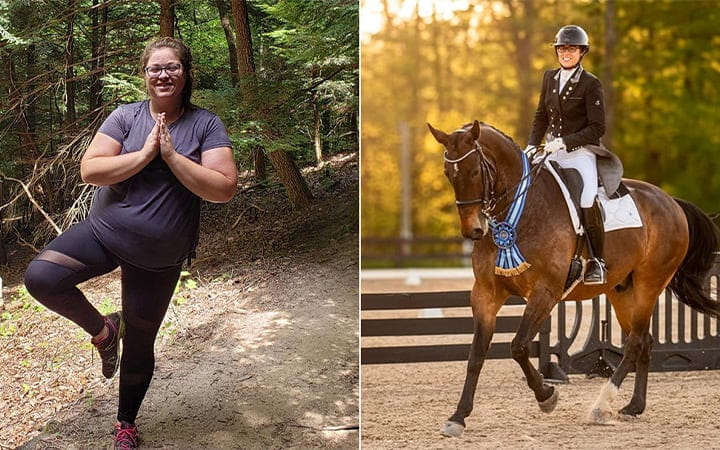Equestrian Riding High Again After Weight-Loss Surgery
August 20, 2025

Meghan Kelley grew up riding horses and is an accomplished equestrian. As an adult, she shares her love of the sport with others as an instructor and trainer. But when her weight started to get in the way of her passion, she made the decision to pursue weight-loss surgery with the University Hospitals Bariatric Surgery Program.
Originally from New England, Meghan, 34, struggled with her weight from a young age. When she went to college and became less active, she started gaining even more weight. She tried multiple diets over the years, and would even lose significant amounts of weight, only to gain it all back. It became a vicious cycle of yo-yo dieting. At her heaviest, Meghan weighed 285 pounds.
The excess weight started to cause mobility issues and back pain. This limited her ability to ride horses, teach and train. Meghan, who also works as a nurse, began to struggle with being on her feet all day at work.
“After yo-yo dieting for so long, I reached a point of no return; I had too much weight to lose,” she says. “I felt like there was no way I could do it without some kind of tool to help me.”
Making the Decision
Meghan was encouraged by the success of friends and coworkers who had undergone weight loss surgery and decided to pursue it. She elected for a laparoscopic sleeve gastrectomy over gastric bypass because she liked that there was less potential for complications.
Once she made up her mind, Meghan wasted no time in getting started. She had her initial consultation with UH bariatric surgeon Leena Khaitan, MD, MPH, in December 2020 and immediately scheduled the other necessary appointments. She was cleared by a cardiologist, psychologist and nutritionist and underwent a sleep study before being approved for surgery.
“Even before my initial consult, I was determined to take it as seriously as possible. I knew it was a commitment to truly changing my relationship with food and my day-to-day life,” she said.
Undergoing Weight-Loss Surgery
By April 2021, a mere four months after starting the process, Meghan was at UH Cleveland Medical Center having her sleeve gastrectomy.
During this minimally invasive procedure, the surgeon removes close to 80 percent of the patient’s stomach, reducing it to roughly the size and shape of a banana. It’s often done laparoscopically, through small incisions in the upper abdomen. Benefits of laparoscopic surgery include shorter recoveries and fewer risks of complications than traditional open surgery.
Meghan says the day of the surgery was very easy, and her entire medical and surgical team worked to make her feel comfortable and cared for.
“From the pre-op nurses to Dr. Khaitan, the anesthesiologist and the entire operating room team, everyone was phenomenal,” she says.
Recovery at Home
Meghan experienced no major complications after her surgery and was able to go home the next day. She experienced minimal pain and did not need any pain medications during her recovery.
The greatest challenge for her was the process of slowly introducing liquids and solid food back into her diet. She also had to get used to a whole new way of eating.
“I don’t think anything can prepare you for how little you can take in after surgery. That part of the recovery was the hardest for me,” she says. “Having to eat and drink smaller, more frequent portions and making sure you’re still getting adequate nutrition despite the limited caloric intake felt like a full-time job.”
Despite struggling with nausea and other digestive problems early on, Meghan said things got significantly easier about six months after surgery.
Losing the Weight
After her sleeve gastrectomy, the weight began to come off quickly. Meghan lost about 60–75 pounds in the first six months after surgery. After that, the weight loss continued but at a slower rate. Currently she is maintaining her weight at around 150 pounds – down 135 pounds from her heaviest.
“From there, it’s about accountability. Watching the scale and choosing the right foods more often than not, but not letting food have so much power,” Meghan says, saying the mental aspect is just as important as the physical.
“Making the decision to eat the ice cream or the candy is not the be all, end all. You don’t have to spiral. Just make your next decision a good one.”
The pain and mobility issues Meghan was experiencing before her surgery have completely resolved. She rides, trains and teaches out of a small farm-based facility in Chardon and continues to work as a nurse. She also plays the flute in a community band in Solon.
Meghan is leading a full and active life and is so thankful for her team at UH for helping her get to this point.
“The design of the program is great and all the help they provide is phenomenal,” she says. “The whole team was always available whenever I had questions, especially my nutritionist. I’m so grateful for the success I’m having with my business and my everyday life.”


